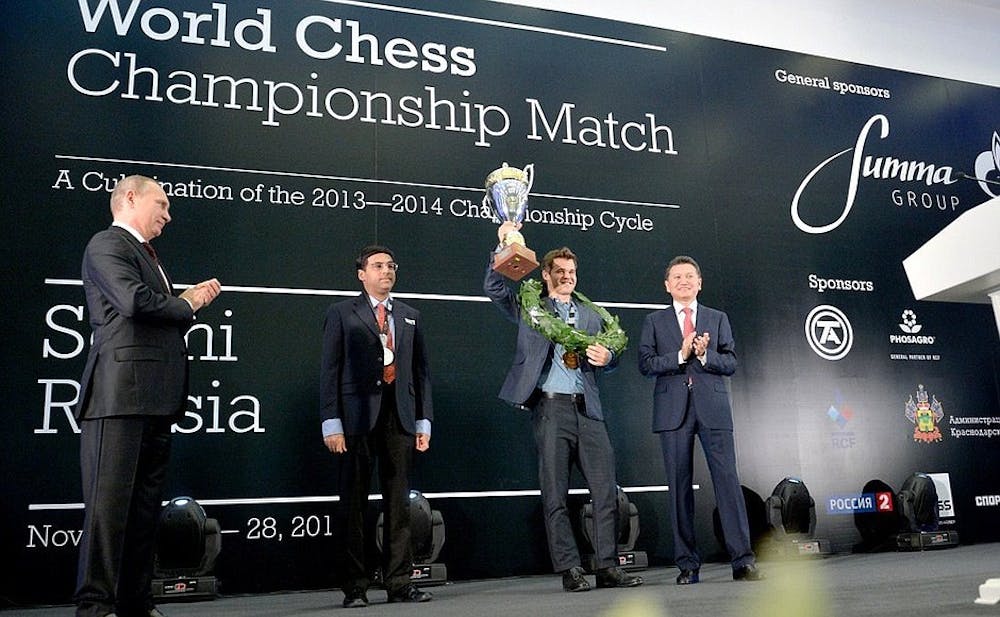The holiday season is in full swing, with Thanksgiving break coming to an end and winter break just around the corner. And this year, in addition to the classic roasted turkey and pumpkin pie, we can also enjoy the World Chess Championship. Reigning world champion Magnus Carlsen is playing against the globally ranked No. 2, American Grandmaster Fabiano Caruana. Here’s why you should care:
This is the first time in over four decades that a U.S. citizen is competing for the world title.
The contender is a young, prodigious Italian-American Brooklynite who — in many respects — perfectly embodies the American spirit. Caruana was raised in New York, but he moved to Italy at a young age to pursue a professional chess career. He played for the Italian federation for 10 years before returning to compete under the U.S. flag. Caruana’s story is emblematic of what defines American culture: a welcoming of talent from diverse backgrounds. The U.S. Olympiad team similarly reflects this diversity, as its top two players after Caruana were born in other countries.
Caruana’s championship run parallels the world championship match from 46 years ago, when another young Brooklyn upstart competed for the title. That was when the electrically polarizing Bobby Fischer iconically wrested the title from the iron grip of the Soviet chess hegemony. During that time, chess was a quintessential metric by which the Soviet Union asserted communism’s ideological superiority over capitalism. The 64-squared game was seen as a symbolic expression of both intellectual dominance and state-centric structuralism.
The Soviets were the Goliaths, an aggregate chess machine inexplicably churning out ever-stronger Grandmasters; the United States, represented solely by Fischer, was very clearly the underdog. Fischer was not supposed to win. Yet in an unprecedented display of brilliance, the lone American triumphed.
His victory revitalized a wave of patriotism across the nation. As evidence of his accomplishment, former President Nixon and then National Security Advisor Henry Kissinger both called Fischer to offer their personal congratulations. Though in retrospect the Cold War tensions had already been mitigated by systematic détente, Fischer’s assiduous decimation of the Soviets planted an emphatic nail in the Soviet coffin.
In modern times, political tension has largely evaporated from the game. There is no analogous “Cold War,” no commensurate machinations of national governments, no additional drama to contribute added significance to the match. Here, the game is — at its core — purely an individual contest, but we can still appreciate the historical undertones of the event.
Although chess is no longer a lynchpin to ideological agendas, it still holds a symbolic significance. The United States is consistently rising in the international ranking. A significant cause of this ascension is our willingness to adopt foreign players and conversely their desire to compete for the United States.

This integration is an idiosyncratic facet of U.S. society, and it should be celebrated. It is characteristic of the United States to find strength in heterogeneity, to cultivate a culture where our unique talents are accentuated and developed through diversity.
Currently, the match is deadlocked 5.5–5.5 after eleven games. There is one more game remaining in the 12-game match, with the final bout scheduled for Monday, Nov. 26. The championship is being held in the U.K., but you can easily find results and updates on The Guardian or Chess.com.
So during this holiday season, take a break from the football game once in a while. Check on the Chess World Championship, cheer for Fabiano Caruana, and maybe even play a couple of games yourself! Monopoly is long-held to be the most contentious holiday board-game, but I personally profess that chess is more engrossing and more exasperating.
Ethan Li is a first-year from Stony Brook, N.Y. He can be reached at ethanl@princeton.edu.









